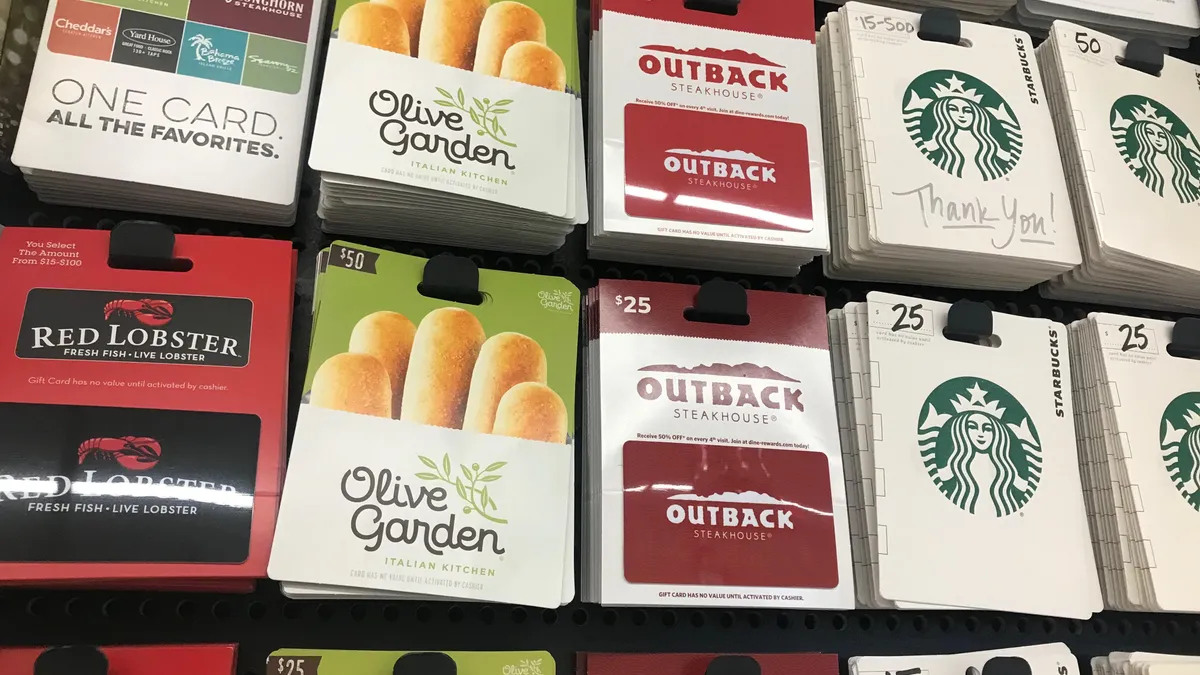Dive Brief:
- Several restaurant chains, including Krispy Kreme and Hooters, are facing lawsuits for allegedly violating the Americans with Disabilities Act by failing to include Braille-imprinted gift cards, according to Restaurant Business. Most actions have been filed by three major law firms in New York so far, but additional lawsuits making similar allegations are anticipated by the end of the year.
- In lieu of renumeration, the lawsuits are seeking a change in the policies that each named defendant uses when it comes to imprinting gift cards with Braille. The suit requests that the name of the issuing establishment and the amount of preloaded money be included, for example, and that the the card's texture and size be designed differently so a vision-impaired customer can identify them in their wallet.
- The plaintiffs want the lawsuits be certified as a national class action representing an estimated 8.1 million people with vision impairments in the U.S.
Dive Insight:
This level of litigation could create a sea change in the restaurant gift card industry to provide differentiated cards that address some of the challenges consumers with visual impairments face, such as not knowing which card is for which restaurant or the amount of money loaded on the card.
Gift cards are an important segment of the retail industry at large, valued at $160 billion dollars in 2018, according to Statista, representing a major growth trend from just $91 billion in 2010. Three-quarters of consumers also prefer to receive a physical gift card in lieu of a digital gift card, according to the National Gift Card Annual B2B Gift Card Report. Starbucks appears to be the only restaurant retailer with Braille-adapted cards, according to the complaints. It started offering a Braille gift card in 2013.
If these lawsuits lead to any action, it could potentially open up other areas within retail such as product tags, labors or gift cards, according to Restaurant Business. For restaurants, it could also open up the need to offer Braille menus, another gray area within the ADA. Restaurants don't have to offer a physical menu in Braille if it has its menu online, according to Mic.
The use of the ADA to bring private lawsuits against businesses has created some controversy, especially among small retailers. The National Restaurant Association maintains an ADA Lawsuit Reform page on its website to help businesses understand potential lawsuits and the nuances of the law. It describes the law's integrity as being undermined by abusive lawsuits filed by attorneys who want to target restaurants and small businesses to "extort costly legal settlements."
These gift card lawsuits echo what has been occurring with digital compliance, another murky area within ADA compliance.
"This has become a gotcha … plaintiff councils are effectively playing an arbitrage game," Lewis Wienr, a partner at law firm Evershed Sutherland, told Restaurant Dive in a recent interview. He said that plaintiffs use software that scans websites to determine if they are outside of compliance and vulnerable to litigation, and entangle small businesses in costly legal battles.
Some lawsuits have challenged brands' websites for failing to be convertible to audio form, for example. The Supreme Court also recently denied Domino's appeal to an ADA lawsuit that claimed its website wasn't accessible to visually impaired users. Making gift cards compliant is a more straightforward fix for restaurants, but businesses should be primed to improve accessibility issues across consumer touch points to protect themselves.














